Born in Japan, 1982. He graduated from the fiction course at The Film School of Tokyo. His short film, “The Prince of Milk”(2008), was invited in many international film festivals. His controversial movie, “Let's Make the Teacher Have a Miscarriage Club” (2012), premiered at the Kanazawa Film Festival and was released nationwide in Japan in 2012. He directed “Puzzle” (2014) starring Kaho, and “Litchi Hikari Club” (2016) starring Shuhei Nomura.
On the occasion of”Liverleaf“, his latest film premiering at the 19th Jeonju International Film Festival, we speak with him about high school movies, snow, violence, the cast, the Japanese movie industry and his future projects.

Most of your films focus on high school students and teachers. Why have you chosen to work on that subject?
I lived a dark life as a student. Before working in the film industry, I worked as a teacher.
This experience is reflected in “Liverleaf”. In addition, there is a tradition of Japanese films set in schools which I continue here.
In “Liverleaf”, there are lot of snowy scenes. Were there any challenges shooting in the cold and snow? In general, can you tell us a bit more about the location the film was shot and your cooperation with Hidetoshi Shinomiya?
The scenes where snow is falling were shot in Niigata which is on the west coast of Japan. The snowfall in the film was created with a snow machine and VFX combined . I asked director of photography Hidetoshi Shinomiya to photograph the film as a “youth movie” instead of “horror” or “thriller”. I also asked the actors to be conscious of angles with a sense of distance. I thought about creating a cold perspective with my actors and shots.
One scene in “Liverleaf” that stood out for me was the bloody kiss between Nozaki and Aiba. Can you tell me more about that scene and its significance for the film?
At first glance, a kiss scene is romantic, but that made me feel disturbed in this particular scene. The word “I will protect you” in Japanese implies violence, a contract that prevents violence, and this also ignores the independence of women. Nozaki accepts the violence of the contract by kissing Aiba. I express this with a bloody kiss, a contract signed in blood.
One of the first violent scenes in the film takes place with the first snowfall. Can you tell us why you chose to use a change in season to move into the second act? The story then turns into a revenge play. I thought the snow scene was effective as a stage for this.
The snow scene gives the impression of a different dimension. If you stage a scene in places where snow has accumulated, the actors may find it difficult to move. I thought that I could express the feeling of a character that has sinned in a snowy scene.

With such a young cast, did you have any challenges working with them? In general, how was the casting process like for the film?
In order to achieve box office success, junior high school students are often played by famous actors over 20 years old. This time, I was able to cast the actors of an age close to the role.
I enjoyed the transformation that Rumi Sayama goes through in the film. Can you tell us about how you guided Rena Ohtsuka on this?
Rumi hurts Taeko, because her love was not rewarded or returned. I explained to Rena Ohtsuka that her violence is similar to self-harm. The same is true for the other characters. The violence depicted within this film could be called “self-injury acts”. It is the story of those who hurt their heart by hurting others.

What is your opinion of the Japanese movie industry at the moment?
There are many comic books being made into films, which makes it difficult to make original scripts into movies. However, manga has many fantastic settings, but it is difficult to develop on the production scale of a Japanese movie. Many anime set in schools are often made into films, so they are becoming more common place. Since movie production is targeted solely to the domestic market, I think that it would be good if production is expanded to overseas markets.
What is next for you? Do you have a new film you are working or a project you want to tell us about?
I have a film in post production called “Forgiven Children” which I am financing on my own The theme of the film is juvenile crime. It will be a work which has a more realistic touch than “Liverleaf”.















